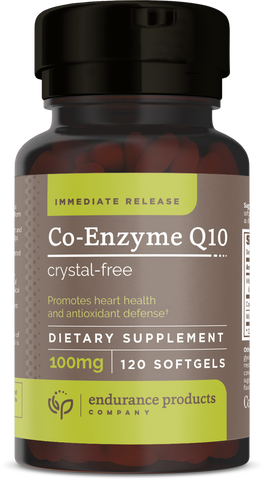When we talk about the body making less of an essential compound as we age, you might think that means after age 65. But in the case of co-enzyme Q10 (CoQ10), we hit peak production by age 30 and production wanes after that.
Why does this matter and how do we keep CoQ10 levels high as we get older? Read on to find out!
Aging, Smoking and Statin Drugs Zap CoQ10 Levels
CoQ10 is a fat-soluble compound that our bodies make. It’s essential and found in almost every cell in the body. CoQ10 works in the mitochondria – the powerhouses of the cells – to produce energy needed by all our tissues and organs, especially the heart and muscles. It’s also considered one of the most crucial lipid antioxidants for neutralizing free radicals that can damage our cells.
Researchers explain that “one of the hallmarks of aging is a decline in energy metabolism in many tissues, especially liver, heart, and skeletal muscle. Tissue concentrations of coenzyme Q10 have been found to decline with age, thereby accompanying age-related declines in energy metabolism.”
Researchers also say that our production of CoQ10 may peak as early as age 20 and by the time we’re 80, we’re producing half of our peak amount! That’s a bit alarming because our bodies need this compound to protect our cell membranes and keep our vital organs healthy.
Plus, as we age, our bodies are less able to neutralize free radicals from environmental toxins, smoking, sunlight, and even exercise. When we can’t neutralize free radicals, we’re at risk of oxidative stress that can damage our tissues and DNA, cause inflammation, and contribute to diseases.
In addition to the declining CoQ10 production as we age, smoking, taking statin drugs, and disorders like heart disease further zap our CoQ10 blood levels. For all of these reasons, it’s important we maintain CoQ10 levels that protect our healthy hearts, promote energy production in the heart, and support healthy blood vessel function.
Getting Enough CoQ10 to Stay Healthy
We can get dietary CoQ10 from meat, especially organ meats like liver or kidneys, oily fish like sardines, mackerel, and herring, some nuts and seeds, and a few vegetables including spinach, cauliflower, and broccoli. However, the amounts of CoQ10 found in food are minimal and may not be enough for our optimal health.
In supplements, the form of CoQ10 is important as our bodies don’t well absorb crystal or powder forms. Our immediate-release, crystal-free CoQ10 features CoQsol-CF® ubiquinone, which is formulated to be easily absorbed and is backed by clinical studies.
This easy-to-swallow soft gel also contains high-potency vitamin E and mixed tocopherols (members of the vitamin E family). You can take one or two a day with meals or as directed by your health care provider.
If you’re concerned about a CoQ10 deficiency, ask your doctor about testing. Additionally, please talk to your doctor before adding CoQ10 if you take medication or have a health condition.

